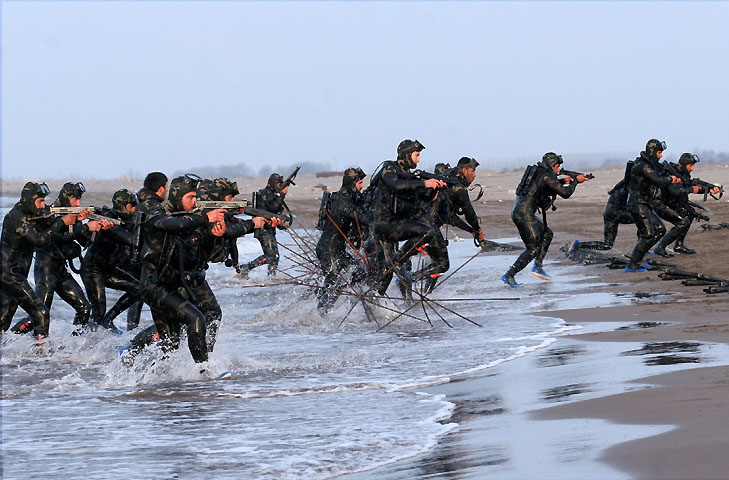IRGC designated “foreign terrorist organisation”
April 9, 2019 | Expert Insights

The US is expected to designate the IRGC as a terrorist organisation in an unprecedented move that sees a national security force as a terror agent.
Background
The Islamic Revolutionary Guard Corps (IRGC) is a branch of Iran's Armed Forces founded after 1979 Revolution on 22 April 1979 by order of Ayatollah Khomeini. Whereas the regular military defends Iran's borders and maintains internal order, according to the Iranian constitution, the IRGC is intended to protect the country's Islamic Republic system. Its expanded social, political, military and economic role under President Mahmoud Ahmadinejad's administration—especially during the 2009 presidential election and post-election suppression of protest—has led many Western analysts to argue that its political power has surpassed even that of the Shia clerical system.
In 2015, Iran agreed to a long-term deal on its nuclear programme with the P5+1 group of world powers - the US, UK, France, China, Russia and Germany, called the Joint Comprehensive Plan of Action (JCPOA). US President Trump, critical of the JCPOA, withdrew the US from the agreement 2018. Sanctions were re-imposed on Iran shortly thereafter, with both sides not willing to return to the negotiation table. The US Department of State created the ‘Iran Action Group,’ tasked with “changing the behaviour of the regime.” Iran's economy has been hit hard since the US sanctions that came to effect in mid-2018 and as a result, nearly half of its imports and exports have halted.
Analysis
Reports suggest that the Trump administration is to designate the IRGC a “foreign terrorist organisation,” in an unprecedented move against a national security force. The designation has typically been employed against non-state actors, and the move would be the first such designation by America of an entire government entity.
The move is a part of a series of escalations used by the Trump administration against Iran, especially against its support for groups in Syria, Lebanon, Iraq and Yemen, in addition to anti-Israel groups in the region. Such a designation institutes sanctions that freezes assets that the IRGC may hold in US administered regions, in addition to a ban on American businesses supporting the Guard.
However, the designation is likely to have significant practical impact for US military and diplomatic activity in the region. For example, in Iraq US military agents have actively engaged with numerous Shiite militias and Iraqi political parties that have historically maintained close ties to the IRGC. In Lebanon, the US provides assistance and works with the Lebanese army. However, Hezbollah, which the US designates a foreign terrorist organisation, is an integral part of the Lebanese government and the designation forces US agents to avoid contact with Hezbollah members. The IRGC maintains active ties with other parts of Lebanese government, and the designation is likely to complicate matters further.
Another source of concern for American authorities, is the propensity for Iran to unilaterally carry out attacks against US troops in Iraq, Syria and other places in the region. The possibility of Iranian retaliation against American assets and anti-American protests increases dangers to US interests in the region.
Iran has already cautioned the US against designating a government arm as a terrorist group, warning that it may have a destabilising effect on the region, potentially warranting a tit-for-tat move. Iran’s Foreign Minister said the move was “another US disaster” and referred to the “quagmire” as a move necessitated by Israeli pressure on the Trump administration by Israel’s Prime Minister Benjamin Netanyahu. The commander of the IRGC said that US troops in the region would “lose their current status of ease and serenity.”
The move, perceived as a gamble by some security analysts, come with ardent support from Secretary of State Mike Pompeo and National Security Advisor John Bolton. The introduction of the Iran Action Group and the recent destination are all moves to publicly increase pressure of Tehran to change its behaviour in the region. Mr. Pompeo’s special representative for Iran, Brian Hook accused Iran, and Iran supported entities, of being responsible for the deaths of 608 US troops in Iraq between 2003 and 2011. This is likely to be used to justify the designation, although the designation must still go through Congress. Despite the House being controlled by Democrats, the designation is likely to pass. However, the gamble lies in the escalation of regional tensions during Israeli elections, the defeat of ISIL, Turkey’s momentum in northern Syria, the peace process in Afghanistan and US troops on the ground in the Middle East.
Assessment
Our assessment is that the decision to designate the IRGC as a foreign terrorist organisation is an unprecedented move and is likely to pass through US Congress despite its Democratic majority. We believe that the move escalates tensions between Iran and the US, especially in light of regional factors including Israeli elections, the defeat of ISIL, Turkey’s momentum in northern Syria, the peace process in Afghanistan and US troops on the ground in the Middle East. We believe that the Trump administration is gambling on Iran’s compliance, enforced by its regional partners, in an attempt to ensure that the IRGC, who has previously controlled Iran’s nuclear program, is not able to focus their attention on weaponising a nuclear weapon. We believe the move is aimed at forcing Iran back to the negotiating table, although it is unlikely that the IRGC is compelled by limited economic sanctions that designation implies.
Image Courtesy: https://upload.wikimedia.org/wikipedia/commons/6/6c/IRGC_naval_execise-2015_%2811%29.jpg, sayyed shahab-o- din vajedi [CC BY 4.0 (https://creativecommons.org/licenses/by/4.0)]








Comments